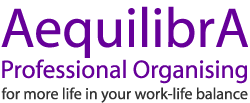
We don't place a high priority on getting organised but being disorganised has a knock-on effect on everything we try to achieve.
Time is wasted, productivity suffers, motivation disappears out of the window and stress levels go through the roof.
We're left wondering how even simple tasks became seemingly impossible. Sometimes we just don't make things easy for ourselves; being disorganised is an example.
To be organised we need to learn to manage our environment, resources, information and time more effectively; the resulting improvements in our productivity can mean more free time, less stress and, ultimately, more life in our work-life balance.
Causes of Disorganisation
There are numerous causes for disorganisation, but there are some key problems affecting most people to a greater or lesser degree:
- poor time management
- information overload
- a counter-productive working environment
Less Haste More Speed
Poor time management is a major cause of disorganisation and no matter how you spend your time, it ticks by at the same rate for everyone. Some people seem to spend their entire waking hours racing around, yet they're either repeatedly late or arrive at the last minute only to find that they've left something behind in the panic.
Another day bites the dust, they wonder where the hours went to and why it is that, despite always being 'incredibly busy', they never seem to make any progress.
Effective time management doesn't mean planning every day as though it were a military manouevre, but it does require some forward thinking.
Information Overload
We say that 'knowledge is power' but we don't teach people how to cope with the information overload. Information comes to us in different forms, to be stored on different types of media and in different types of locations. We barely have time to digest the latest arrivals and decide what to do with it before the next load turns up.
We keep far more than we need for longer than we should, and the important and useful stuff gets lost amongst that which is duplicated, obsolete, junk mail and spam.
Information management is an increasing problem but a neglected subject; before we can begin to tackle the backlog we need methods for handling the new stuff as it arrives.
A Place For Everything?
It's stressful and counter-productive trying to work in an environment where you can't find anything because it's hidden away under piles of clutter. We don't have 'a place for everything' because there isn't room for everything. We surround ourselves with 'stuff' as though it were a comfort blanket, and feel obliged to fill every space as soon as it appears, perhaps for fear of it being wasted.
Parkinson's Law states that "work expands to fill the time available for it's completion". Clutter has a similar property: it expands to fill the space allowed for it's storage. This short piece about clutter describes some of the frustrations we encounter in trying to keep it under control.
There's more to managing your environment than simply getting rid of the clutter, but it's a logical first step. Being organised also means managing your resources; locating physical resources in the most appropriate place and making the best use of the 'tools' at your disposal.
Get a Headstart
Getting organised may be an activity you do once to improve your current situation, but being organised is an ongoing process requiring a change in habits.
However, trying to change all of your habits in one go is a recipe for failiure; changing one at a time can help you to decide whether the change was an effective one.
Methods that work well for others may not work as well, or at all, for you because they may not be suited to your needs or working style.
A 'suck it and see' approach is required. Don't be afraid to try new methods because even if they don't work as well in practice as you'd hoped, you're likely to learn something valuable that will help you choose a better system next time.
In some cases, making minor changes to current methods can lead to big improvements; in other cases a new approach is a better solution.

